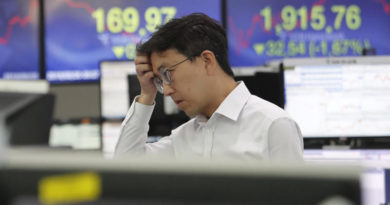WORLD FINANCE: Battling Emerging Market Bias
A coffee seller accepts digital payment using QR code in Medan, North Sumatra, last week. (Antara Photo/Septianda Perdana)
.
.
BY :AMIT ANAND

The world today is no longer dictated by developed markets. To quote Susan Lund, a partner at McKinsey Global Institute, “while the growth rate of global trade in goods has grown more slowly than it did in the past 20 years, the growth of volume of internet traffic around the world has increased by 100 times over the last 15 years. Today data flows and the digital economy are the connective tissue around the world.”
Not only that, the world today is becoming increasingly multipolar and we are seeing more trade between developing countries. Emerging nations will play a more influential role in the global economy in the next decade, especially with the global advent of digitalization.
One region under scope is Southeast Asia – home to 650 million people (three out of five people under 35) who are the most digitally connected and engaged population in the world. With its regional GDP growing consistently at 5-6 percent, it’s also expected to become the world’s fourth-largest economic block by 2030.
 Ads by: Memento Maxima Digital Marketing
Ads by: Memento Maxima Digital Marketing@ [email protected]
– SPACE RESERVE FOR YOUR ADVERTISEMENT
Indonesia is leading this region in terms of pure size and market potential. The country has been growing by over 5 percent annually and has drastically reduced its poverty rate by over half since the 1998 Asian financial crisis.
This has resulted in a thriving middle-class consumer base, making the country an attractive investment destination, notwithstanding its own significant regional economic contributions.
 Ads by: Memento Maxima Digital Marketing
Ads by: Memento Maxima Digital Marketing
@ [email protected]
– SPACE RESERVE FOR YOUR ADVERTISEMENT
Prejudice Lingers
Emerging markets like Indonesia have huge opportunities across various sectors from B2B to B2C, with everything in between.
Yet prejudice against emerging markets continues to guide investment decisions as these markets are perceived to be inherently high risk.
The lens one needs to take is risk mitigation. It’s about recognizing the underlying opportunity, identifying key sectoral and secular themes to invest in, and managing the risk.
A fundamental risk associated with emerging markets, like Southeast Asia, is the dearth of comprehensive electricity infrastructure. This will be key to facilitating new economic opportunities, especially in the digital economy.
As per Adiba Ighodaro, a partner and head of strategic relationships at Actis Capital, $14 trillion needs to be invested in emerging markets for electricity infrastructure. However, the quantum of capital being invested and deployed is exactly in the opposite geographies!..
 Ads by: Memento Maxima Digital Marketing
Ads by: Memento Maxima Digital Marketing
@ [email protected]
– SPACE RESERVE FOR YOUR ADVERTISEMENT
Time for Inclusive Growth
We are seeing greater global economic integration now. We must learn how to navigate this transition and this intricate web of global interdependencies to ensure maximum benefit for all.
Hence, it’s not surprising that when China’s growth slows, we’ll see an impact on global markets. New rules of engagement must accommodate the emerging economies along with the developed markets.
Indonesia’s development trajectory may influence how other emerging markets sustain their growth, especially as the country already has its own megacity in Jakarta. In the decades ahead, we can expect to see more megacities in emerging markets thanks to increased urbanization.
However, the sinking problem that the city now faces (and with Indonesia’s government considering a new location for its capital) is a pertinent lesson for emerging markets that are coming to grips with mass urbanization and overpopulation, as well as the environmental strain it will place on cities.
Overall, there remains a distinction between emerging and developed markets. In Indonesia’s case, it is apparent in the development challenges it is facing as its economy matures. What may have served the country well in its past decades’ long rapid growth may not be sustainable moving forward.
Perhaps the most prominent takeaway is the transformation of globalization itself. By teaching and learning from emerging nations, can the developed world ensure they grow at a rate that is both economically and socially conscientious?
Amit Anand is a co-founder and managing partner of Jungle Ventures
.
All photographs, news, editorials, opinions, information, data, others have been taken from the Internet ..aseanews.net | [email protected] |
For comments-Email to : Pahulu Gan|
. [email protected]









